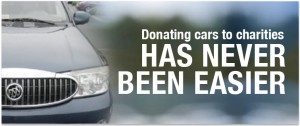Car donations are a great way to give—if done right
By Warren Cole Smith
(WNS)–Some persons choose as part of their lifestyle not to sell old furniture, clothes, or cars, but to donate them. Lots of nonprofits now advertise for car donations: Support a group you revere and get a tax write-off. But one piece of advice is worth remembering: Let the donor beware.
Earlier this year, the Los Angeles Times investigated a California-based organization called Cars 4 Causes. The group claims to be the “charity that gives to charities,” but it sometimes gives only $25 to the organization after it sells the car and pays expenses.
Another nonprofit, Kars4Kids, claims to use donated cars to meet the needs of Jewish children and their families. In 2013 the organization received more than $28 million in donations, but it paid out less than $13 million, and had more than $13 million in marketing and administrative expenses. In 2009, Oregon fined Kars4Kids $65,000 for misleading donors. A related organization, Joy for Our Youth, paid another $65,000 in fines to Pennsylvania, also in 2009.
National Public Radio, the American Cancer Society, Habitat for Humanity, WORLD, and other groups accept car donations via Advanced Remarketing Services, a company based in Rhode Island. The company’s president, Joe Hearn, said ARS charges a flat $55 fee per car for its services—but it does pass through other expenses, including towing and title transfer. The bottom line, Hearn says, is that ARS has handled more than $85 million in donations since 2007 and turned over 83 percent of the proceeds to the organizations.
 Cars for Charity, a Denver-based ministry, handles auto donations for Focus on the Family and dozens of other Colorado-based organizations, including Teen Challenge, Denver Urban Ministries, and Catholic Charities. Focus on the Family sometimes keeps donated cars “for ministerial purposes,” said Focus Vice President Paul Batura: “A few years back we received an [all-terrain vehicle], and we’ve been utilizing that for snow removal.”
Cars for Charity, a Denver-based ministry, handles auto donations for Focus on the Family and dozens of other Colorado-based organizations, including Teen Challenge, Denver Urban Ministries, and Catholic Charities. Focus on the Family sometimes keeps donated cars “for ministerial purposes,” said Focus Vice President Paul Batura: “A few years back we received an [all-terrain vehicle], and we’ve been utilizing that for snow removal.”
Other organizations keep lots of donated vehicles. Wycliffe Bible Translators has a large logistics, transportation, and communication hub, the JAARS Center, near Waxhaw, N.C. It’s home base for missionaries on sabbatical, on furlough, or in retirement, and they put donated cars to day-to-day use when in the United States.
Miracle Hill Ministries in Greenville, S.C., sells donated cars at very low prices to men and women graduating from its recovery programs. By purchasing the car, even at a nominal price, the graduates have the satisfaction of knowing they earned the vehicle, said Matthew Hyde, who coordinates the program. Reliable transportation also makes getting and keeping a job much easier.
Given these options, what’s a donor to do? Should you sell your car and donate the money, give the car to a ministry that will sell it through a brokerage service, or give your vehicle to a ministry that will use it? Joe Hearn of ARS said, “You should ask a lot of questions, but all the questions should be getting you to the answer to this one question: Do I trust the organization and want to support its work?”
Hearn advised a few questions about what the organization will do with the car: “There are lots of villains in this space taking advantage of donor ignorance. … The responsibility is always on the donor to be educated and make the wisest possible decisions with your resources.”







